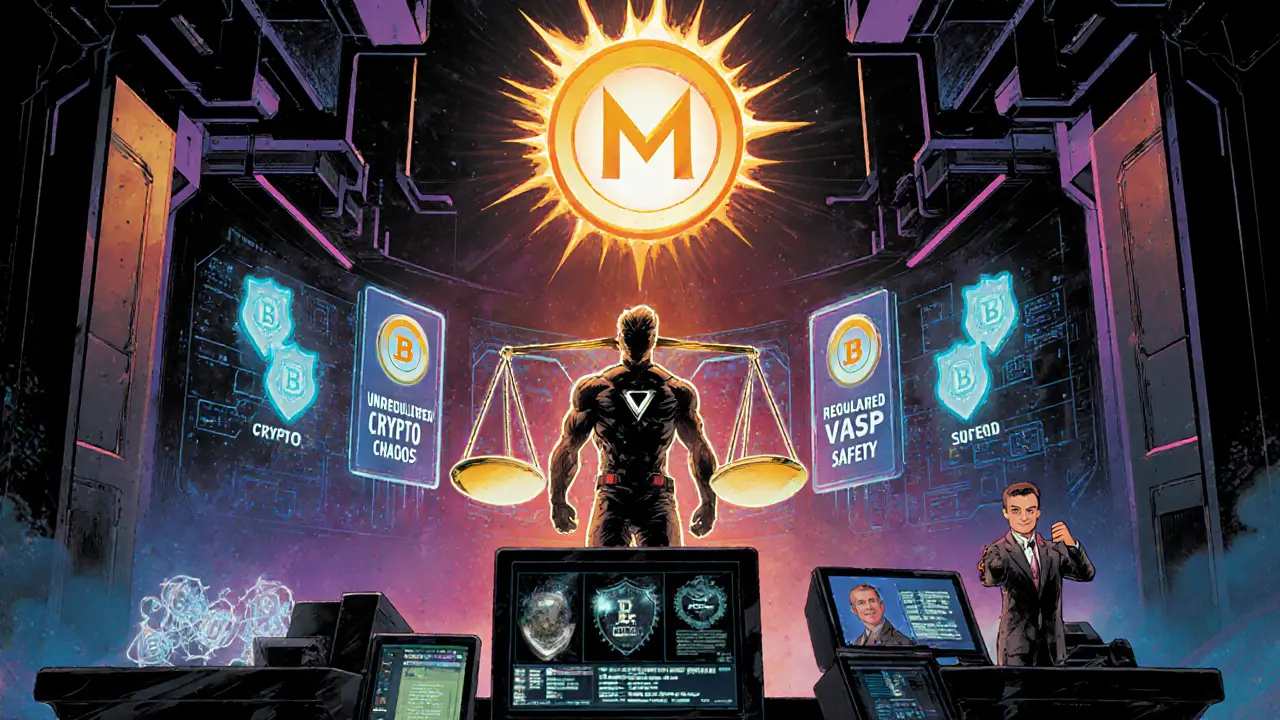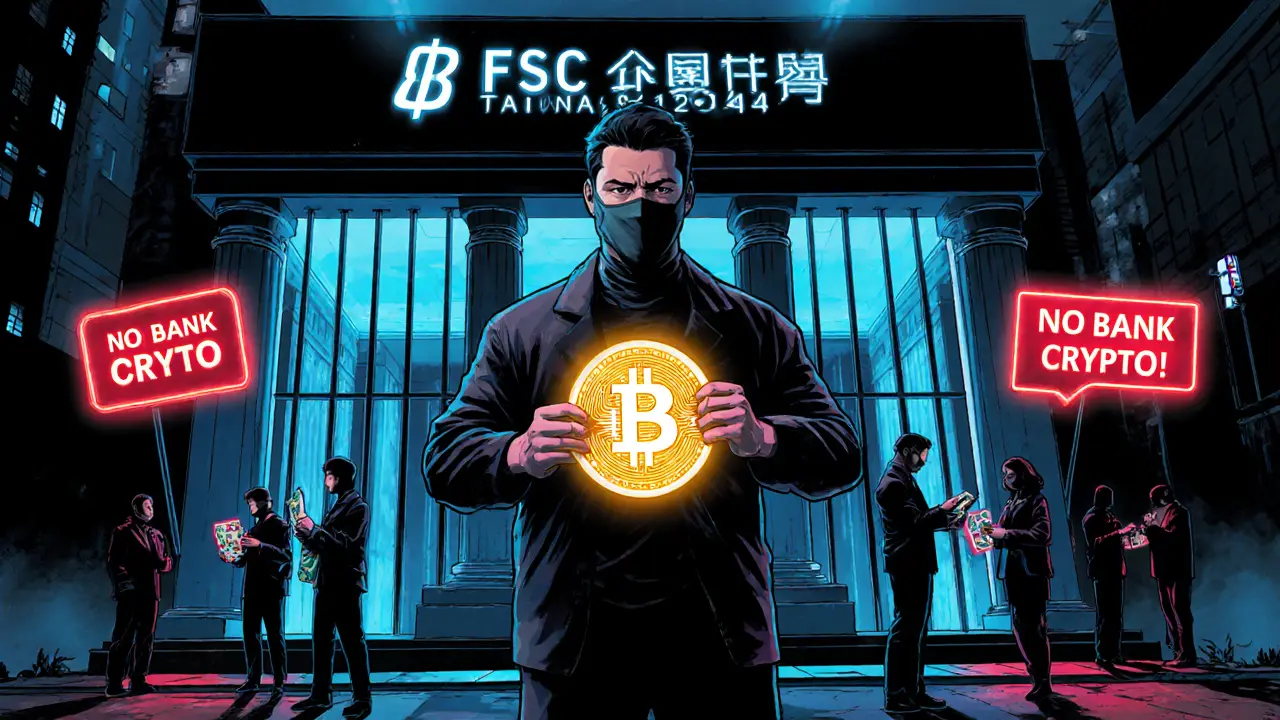VASP Registration Cost Calculator
Estimate Your VASP Registration Costs
Based on Taiwan's regulatory requirements effective January 1, 2025, calculate your estimated costs for registering a Virtual Asset Service Provider (VASP). The FSC requires NT$2-5 million in compliance infrastructure.
If you live in Taiwan and want to buy Bitcoin using your bank account, you can’t. Not directly. Not through your local bank. Not even with your credit card. That’s not because you’re doing something wrong-it’s because the government made it illegal. Since 2014, Taiwan’s Financial Supervisory Commission (FSC) has blocked banks from handling any cryptocurrency transactions. This isn’t a temporary rule. It’s the backbone of a carefully designed system that lets people own crypto-but keeps it locked out of the traditional banking world.
Why Taiwan Keeps Banks Away from Crypto
Taiwan doesn’t ban crypto. In fact, over 2.3 million people-about 10% of the population-own digital assets as of late 2024. The issue isn’t ownership. It’s integration. The FSC sees crypto as a high-risk, speculative asset, not money. That’s why they drew a hard line: banks can’t exchange Bitcoin for New Taiwan Dollars, can’t process crypto payments, and can’t let customers use credit cards to buy digital coins. The same rules that block online gambling and speculative stock trading also apply to crypto. The goal? To prevent money laundering, protect consumers from sudden losses, and keep the banking system stable.It’s not about stopping innovation. It’s about controlling where it happens. By keeping crypto separate from banks, Taiwan avoids the kind of systemic risks seen elsewhere-like when a crypto collapse drags down traditional financial institutions. This approach has worked so far. There’s been no major bank failure tied to crypto in Taiwan. And unlike countries that let banks offer crypto services, Taiwan hasn’t seen a flood of retail investors getting burned by leveraged trading or unstable tokens.
What’s Allowed: The VASP System
If banks won’t touch crypto, how do people trade? Through registered Virtual Asset Service Providers (VASPs). Starting January 1, 2025, any crypto exchange or wallet service operating in Taiwan must be officially registered with the FSC. Before this, companies could choose whether to comply. Now, it’s mandatory. Unregistered platforms face fines up to NT$5 million (about $155,900) and possible jail time for operators.As of late 2024, only 23 companies made it through the registration process. The biggest is MaiCoin, which handles around $70 million in trades every day. These VASPs have to follow strict rules: they must separate customer funds from company money, use advanced cybersecurity systems, and report suspicious activity to regulators. They’re also required to verify every user’s identity-no anonymous accounts allowed.
This system forces crypto businesses to operate like financial institutions, even if they’re not banks. It’s why MaiCoin is planning to go public on Taiwan’s stock exchange. It’s not just a crypto exchange anymore-it’s a regulated financial player.

How People Actually Buy Crypto in Taiwan
You won’t find a button on your Taipei Bank app that says “Buy Ethereum.” But that doesn’t mean you can’t get crypto. People use workarounds. Many turn to peer-to-peer (P2P) platforms where buyers and sellers meet directly. Someone with Bitcoin might sell it to you in exchange for a bank transfer to a friend’s account-or even cash. Others use international exchanges like Binance or Bybit that have registered as VASPs in Taiwan. These platforms let you deposit New Taiwan Dollars via third-party payment processors, not directly from your bank.It’s messy, but it works. Reddit threads from r/Taiwan and r/cryptocurrency show users sharing tips on how to move money without triggering bank flags. Some use e-wallets like LINE Pay or Pi Pay to send funds to VASPs indirectly. Others pay in cash at designated pickup points. While these methods aren’t perfect, they’ve kept the market alive despite the banking ban.
Users rate local VASPs like MaiCoin around 3.8 out of 5 on review sites. International platforms that follow Taiwan’s rules score higher-4.2 out of 5-because they offer better tools and lower fees. The trade-off? You’re still working around the system, not through it.
The Stablecoin Shift Coming in 2025
Here’s where things might change. In June 2025, Taiwan plans to launch its first regulated stablecoin rules. Unlike USDT or USDC, these won’t be issued by private companies. They’ll be backed by the government and tied to the New Taiwan Dollar. Think of them as digital cash issued by the Central Bank, not by a corporation.This is a big deal. It means banks could eventually be allowed to offer these government-backed stablecoins. Not Bitcoin. Not Ethereum. But a digital version of the NT$ that’s as safe as physical cash. The FSC sees this as a way to give people the benefits of blockchain-fast, cheap transfers-without the risks of unregulated crypto.
It’s also a test run for something bigger: a Central Bank Digital Currency (CBDC). The Central Bank of the Republic of China finished its feasibility study in late 2023 and began prototype testing in early 2025 using the same infrastructure as Taiwan’s digital vouchers. If that works, a full CBDC could follow within the next few years. And if banks start handling government digital money, the line between “crypto” and “banking” might blur-for regulated assets only.

Who Benefits and Who Struggles
Compliance experts praise Taiwan’s model. PwC Taiwan called it one of the clearest regulatory frameworks in Asia. It reduces fraud, protects users, and gives legitimate businesses a path to operate legally. For investors, it means less chance of getting scammed by fake exchanges.But it’s not easy for crypto startups. Setting up a VASP costs between NT$2 million and NT$5 million-mostly for legal compliance, security audits, and staff training. New companies often spend 3 to 6 months just getting approved. And even after registration, they struggle to find banks that will handle their business accounts. Payroll, vendor payments, office rent-all these basic needs become headaches because banks still fear any connection to crypto.
That’s why the Taiwan Virtual Asset Service Provider Association was formed in June 2024. It’s a self-regulatory group run by the registered exchanges themselves. They share best practices, lobby for clearer rules, and try to convince banks that not all crypto is risky. Progress is slow, but it’s happening.
The Bigger Picture: Innovation Without Integration
Taiwan’s model is unique. Most countries either ban crypto outright or let banks offer it. Taiwan chose a third way: let people own it, let businesses trade it, but keep it out of the banking system. The result? A thriving crypto market with low systemic risk.Daily trading volume in Taiwan hits $200 million, with Bitcoin and Ethereum making up 65% of activity. The number of users is growing at 15% a year. People aren’t giving up-they’re just adapting. They use P2P, international VASPs, and payment workarounds. The system isn’t perfect, but it’s functional.
And if the government’s stablecoin and CBDC projects succeed, we might see a future where digital money is part of everyday banking-but only when it’s issued and controlled by the state. That’s the real goal: not to ban crypto, but to bring it under the same level of oversight as traditional finance.
For now, if you’re in Taiwan and want crypto, you’ll need patience, creativity, and a willingness to navigate a system designed to keep banks safe-even if it makes life a little harder for users.
Can I use my Taiwanese bank account to buy Bitcoin directly?
No. Taiwanese banks are legally prohibited from processing any cryptocurrency transactions, including direct purchases, deposits, or withdrawals. This rule has been in place since 2014 and still applies as of 2025. You must use registered Virtual Asset Service Providers (VASPs) and indirect methods like peer-to-peer trading or third-party payment processors.
Are crypto exchanges legal in Taiwan?
Yes, but only if they’re registered with the Financial Supervisory Commission (FSC). Since January 1, 2025, all crypto exchanges operating in Taiwan must be officially registered as Virtual Asset Service Providers (VASPs). Unregistered platforms are illegal and face heavy fines or criminal charges. As of late 2024, only 23 exchanges have completed registration, including MaiCoin and other local firms.
Can I use my credit card to buy crypto in Taiwan?
No. Since July 2022, Taiwan’s FSC has banned credit card acquirers from processing payments for cryptocurrency purchases. This rule treats crypto transactions the same as online gambling and speculative stock trading. You cannot use any Taiwanese-issued credit or debit card to buy Bitcoin, Ethereum, or other digital assets through local platforms.
What’s the difference between crypto and stablecoins in Taiwan’s new rules?
Traditional cryptocurrencies like Bitcoin and Ethereum are classified as speculative virtual commodities and remain banned from banking systems. Stablecoins, however, are being redefined. Starting in June 2025, only government-backed stablecoins tied to the New Taiwan Dollar (TWD) will be allowed. These will be issued by regulated institutions and treated more like digital cash, potentially allowing banks to support them-unlike unregulated stablecoins like USDT or USDC, which remain restricted.
Is a Central Bank Digital Currency (CBDC) coming to Taiwan?
Yes. The Central Bank of the Republic of China completed a feasibility study in late 2023 and began prototype testing in early 2025 using existing digital voucher infrastructure. A full-scale CBDC, if launched, would be a digital version of the New Taiwan Dollar issued by the government. It would likely be the first type of digital asset that banks are allowed to handle directly, setting a new precedent for regulated digital money in Taiwan.
Why do Taiwanese crypto users prefer international exchanges?
International exchanges that register as VASPs in Taiwan (like Binance and Bybit) often offer better user interfaces, lower fees, and more trading pairs than local platforms. While local exchanges like MaiCoin are compliant and safe, they’re limited in features due to strict regulatory constraints. Users report higher satisfaction (4.2/5 average) with international VASPs for functionality, even though they still face the same banking restrictions.
How much does it cost to start a crypto business in Taiwan?
Starting a registered Virtual Asset Service Provider (VASP) in Taiwan costs between NT$2 million and NT$5 million (roughly $62,000-$155,900 USD). Most of this goes toward compliance infrastructure: cybersecurity systems, legal fees, KYC/AML software, and hiring compliance officers. The registration process takes 3-6 months, and ongoing audits are required to maintain status.


Frank Verhelst
November 22, 2025 AT 03:14Love how Taiwan’s keeping it real-no bank drama, just clean crypto access. 🚀
Leisa Mason
November 23, 2025 AT 03:34Of course the government bans direct bank access. They’re terrified of innovation. This isn’t regulation-it’s institutional cowardice wrapped in compliance jargon.
Rob Sutherland
November 23, 2025 AT 08:48It’s fascinating how Taiwan treats crypto like a wild animal-not to be caged, but kept at arm’s length. The balance between freedom and stability feels almost poetic. People adapt, they always do. That’s not failure. That’s resilience.
Tim Lynch
November 23, 2025 AT 17:24They didn’t ban crypto. They banned the illusion that it belongs in the same room as FDIC-insured savings accounts. That’s not repression-it’s maturity. Most countries are still screaming about ‘financial inclusion’ while their citizens lose life savings to rug pulls. Taiwan? They’re quietly building a firewall between chaos and collapse.
And now they’re about to launch a state-backed digital dollar? That’s not a compromise. That’s the next evolution of monetary sovereignty. The rest of the world is still arguing over whether crypto is money. Taiwan already moved on.
Melina Lane
November 24, 2025 AT 14:59Really appreciate how this breaks down the real ways people are getting crypto in Taiwan. P2P, LINE Pay, cash pickups-it’s grassroots finance at its most creative. The system’s clunky, but people are making it work. That’s what matters.
andrew casey
November 24, 2025 AT 17:37While the FSC’s framework exhibits commendable structural rigor, one must acknowledge the latent inefficiencies inherent in the VASP registration paradigm. The capital expenditure required for compliance-ranging from NT$2M to NT$5M-is not merely a barrier to entry; it is a de facto oligopolistic mechanism that entrenches incumbents while excluding emergent entrepreneurs. This is not innovation. It is regulatory capture disguised as prudence.
Lani Manalansan
November 25, 2025 AT 08:57As someone who’s lived in both the U.S. and Taiwan, I can say this model is quietly brilliant. In America, we let banks offer crypto like it’s a new flavor of yogurt. Then we get crashes, lawsuits, and bankruptcies. Here? People still trade. Still own. Still grow. But the system doesn’t collapse when a token pumps and dumps. That’s wisdom, not restriction.
Roshan Varghese
November 25, 2025 AT 22:33They say it’s to prevent money laundering but come on. This is all about control. The government doesn’t want people using crypto because then they can’t track every single cent you spend. Next they’ll ban cash too. CBDC? That’s the real goal-total surveillance under the guise of ‘stability.’ Wake up people.
Dexter Guarujá
November 26, 2025 AT 17:24Of course Taiwan’s doing this right. Unlike the U.S., where regulators are clueless and banks are crooked, Taiwan has actual leadership. No wonder their economy is stable while America’s crypto scene is a circus. If you want real financial discipline, look to Asia-not Silicon Valley’s crypto bros.
Jennifer Corley
November 27, 2025 AT 01:33They say VASPs are safe, but how many of them are just fronts for laundering? The FSC’s registration list is a joke-23 companies? That’s less than a handful. And don’t get me started on Binance’s ‘compliance.’ It’s theater. People think they’re protected, but they’re just being manipulated by the same players with a new logo.
Natalie Reichstein
November 28, 2025 AT 04:10If you’re using P2P or cash to buy crypto, you’re already gambling. You’re not being smart-you’re being desperate. And now you’re trusting strangers with your life savings because the government said no? That’s not innovation. That’s recklessness with a side of rationalization.
Kaitlyn Boone
November 29, 2025 AT 18:01so the government blocks banks but lets p2p happen? lol. that’s like banning cars but letting people ride horses on the highway. no one’s safe here. and the stablecoin thing? just a backdoor to control everything. they’ll track your every move. trust me.
James Edwin
November 30, 2025 AT 05:41What’s interesting is how the people adapted. No bank? Fine. Use LINE Pay. Use cash. Use a friend’s account. The system didn’t kill crypto-it just forced it to grow roots outside the official structure. That’s how real adoption happens-not through apps, but through necessity.
Kris Young
December 1, 2025 AT 00:36Regulation is not bad. Regulation is necessary. Banks are too important to be exposed to crypto’s volatility. VASPs are the right middle ground. KYC is good. Separating funds is smart. Fines for unregistered platforms? Absolutely. This is how it should be done.
LaTanya Orr
December 2, 2025 AT 03:05I think the real story here isn’t the ban-it’s the quiet revolution happening in the gaps. People aren’t waiting for permission. They’re building their own paths. The government didn’t stop crypto. They just made it harder. And somehow, that made it more honest. No hype. No promises. Just real people trading, figuring it out, one transfer at a time.
Ashley Finlert
December 3, 2025 AT 19:02There is something profoundly elegant about Taiwan’s approach. It does not romanticize decentralization nor does it capitulate to fear. It recognizes that money is power-and power must be tempered. The state-backed stablecoin is not a surrender to the old system. It is a reclamation of monetary sovereignty through new tools. This is not crypto versus banks. This is evolution-deliberate, disciplined, and deeply Asian in its patience.
Chris Popovec
December 3, 2025 AT 20:30Let me break this down for the sheeple: FSC = central bank puppet. VASPs are just front companies with fancy compliance certs. The ‘registration’ is a honeypot. They’re collecting your KYC data, tracking your trades, and building a digital fingerprint for the CBDC rollout. This isn’t safety-it’s onboarding. And that ‘stablecoin’? It’s not digital cash. It’s the first brick in your prison wall.
Marilyn Manriquez
December 4, 2025 AT 06:42This is one of the most thoughtful crypto policies I’ve seen anywhere. Not perfect, but balanced. People still have access. Businesses still have a path. The system isn’t broken-it’s being carefully rebuilt. That takes courage. Most countries are still stuck in panic mode.
Charan Kumar
December 5, 2025 AT 14:00in india we have same problem but no one talks about it. people here use binance with upi and no one cares. taiwan is doing it right with rules. but why do they make it so hard for startups? nt$5 million? that’s a joke. we need more support not more walls
Lara Ross
December 7, 2025 AT 07:22Thank you for this comprehensive, well-researched breakdown. The distinction between speculative assets and state-backed digital currency is precisely the nuance that global policymakers must adopt. Taiwan’s model exemplifies regulatory foresight-not obstruction. This is the blueprint for responsible innovation.